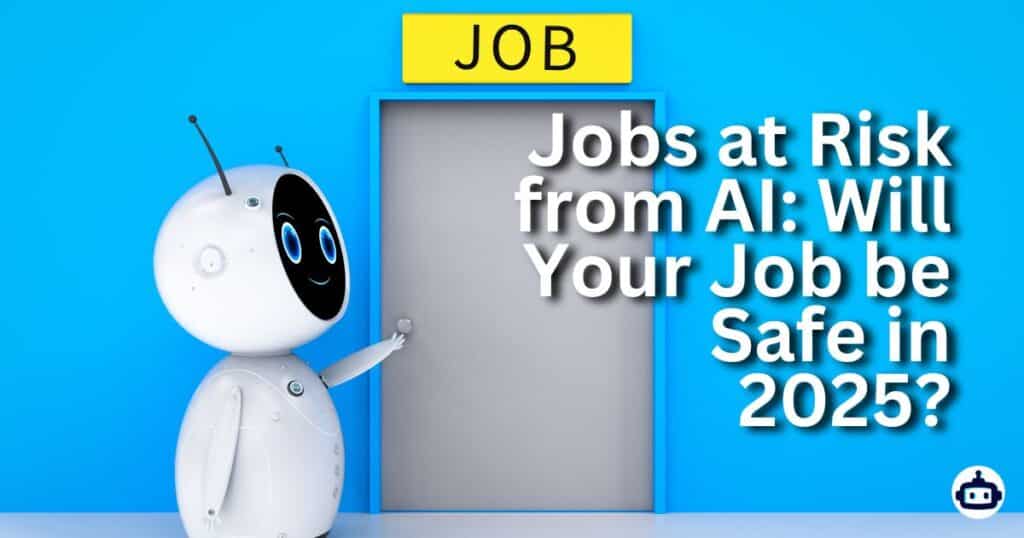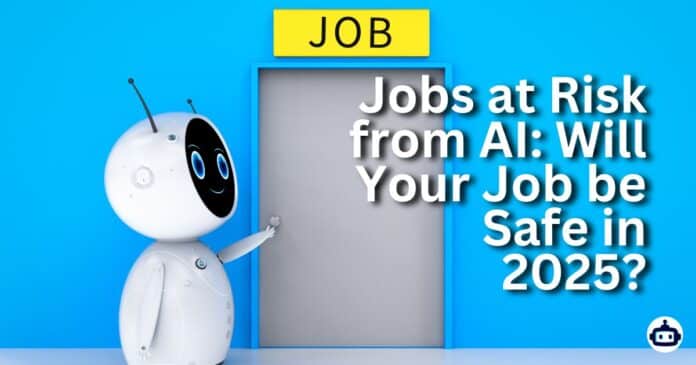
Introduction to AI and Job Security
Defining Artificial Intelligence
Artificial Intelligence (AI) involves creating computer systems that can perform tasks typically requiring human intelligence. These tasks include decision-making, language translation, speech recognition, and more. With AI’s integration into various industries, its influence on job security and the labor market is a critical concern.
Understanding AI’s capabilities helps in analyzing how your job might be impacted and identifies which jobs are at risk from AI.
Historical Impact of AI on the Labor Market
Historically, the integration of AI in the workplace has led to both the displacement and creation of jobs. Industries such as manufacturing and administrative have seen automation replace routine tasks previously done by humans. This shift has sparked fears about increasing jobs at risk from AI, as machines can often perform the same tasks faster and with fewer errors.
However, AI has also created new job opportunities, particularly in sectors like AI development, data analysis, and cybersecurity. These roles require specific skills that machines currently cannot duplicate effectively, emphasizing the need for a skilled workforce capable of working alongside intelligent systems.
The historical perspective provides a framework for understanding potential future trends and preparing for changes in job requirements and availability caused by AI advancements.
As AI technology evolves, your awareness and adaptability to new roles and technological demands become crucial. Proactively developing new skills and understanding AI’s transformative potential can help mitigate risks associated with job security in an AI-influenced employment landscape.
Understanding Which Jobs Are at Risk from AI
The advent of artificial intelligence has transformed the landscape of the modern workplace. Your job may fall into the category of jobs at risk from AI depending on several critical factors. The primary attribute that amplifies this risk includes the level of routine and predictability involved.
Criteria That Put Jobs at Risk
Jobs that involve repetitive tasks are particularly vulnerable to AI disruption. The capacity of AI to learn and execute repetitive actions swiftly and precisely makes it an ideal candidate to replace certain human roles. Another key criterion is the amount of routine decision-making needed.
If your job requires minimal creativity or strategic thinking and relies heavily on following a predetermined script or routine, it stands at a higher risk. Data processing and management tasks, which are structured and rule-based, can often be more efficiently handled by algorithms, placing such positions at risk as well.
Examples of Vulnerable Job Sectors
Several sectors exhibit a higher susceptibility to AI integration. For instance, the manufacturing industry, known for its heavy reliance on repeatable and precise tasks, stands on the front lines. Automation has already replaced many manual jobs in factories, and AI continues to push this evolution further.
Retail jobs are also highly vulnerable, especially roles centered around inventory management and checkout processes. AI technologies can automate these processes, reducing the need for human intervention.
The transportation sector is another area experiencing significant upheaval with the emergence of AI innovations like autonomous vehicles. Drivers in delivery and trucking services might find their jobs at risk as technology advances.
In the administrative and clerical fields, tasks such as scheduling, data entry, and basic customer service are increasingly being performed by sophisticated software systems, putting traditional office jobs at risk.
As AI technology continues to evolve, it is crucial to adapt and acquire new skills that are less likely to be replicated by machines. Understanding which sectors and roles are likely to be impacted can help you navigate future career paths and secure your professional future against the advancing tide of automation.
Jobs Most Likely to Be Replaced by AI by 2025
Manufacturing and Production Jobs
As you navigate your career choices, it’s essential to be aware that many manufacturing and production jobs are at risk from AI. Automation technologies have evolved, making tasks such as assembling, packaging, and quality control increasingly automated.
If your role involves repetitive, predictable activities, AI and robotics might replace these tasks, streamlining operations and reducing the need for human labor. This transformation aims to enhance efficiency but leaves fewer opportunities for traditional hands-on roles.
Administrative and Clerical Positions
Your job as an administrative or clerical worker could also face significant changes due to AI advancements. With software now capable of handling tasks like scheduling, data entry, and even complex decision-making, the demand for human input is diminishing.
AI tools can process information more quickly and accurately than humans, reducing errors and increasing productivity. If your role includes routine paperwork or record keeping, it’s crucial to adapt by gaining skills that AI cannot easily replicate, such as strategic planning and human-centered services.
Transportation and Delivery Services
If you work in transportation or delivery services, you should be aware that these jobs are at risk from AI as well. Autonomous vehicles are becoming more prevalent, poised to revolutionize how goods and individuals are transported.
Companies are investing heavily in this technology to enhance safety and reduce operational costs. This shift not only affects truck drivers but also those in supportive roles, which are increasingly being managed by sophisticated logistic systems. To stay relevant, focusing on oversight and management skills that complement AI technology will be beneficial.
Emerging Job Opportunities Due to AI Expansion
AI Maintenance and Development Roles
As AI technology continues to integrate into various industries, the demand for AI maintenance and development roles grows. You might find yourself drawn to careers focused on designing, updating, and maintaining AI systems.
These roles require not only technical skills but also a keen understanding of machine learning algorithms, data analysis, and software development. If your job is currently at risk from AI advancement, gaining skills in these areas could ensure your employability in the tech-driven landscape of 2025.
Human-AI Interaction Specialists
Another area where you’ll see growth is in human-AI interaction. As businesses increasingly rely on AI to handle operations, the need for specialists who can manage the interface between humans and artificial systems becomes crucial.
These specialists focus on improving user experience, ensuring that AI systems are understandable and accessible by average users, and managing the ethical implications of AI decision-making. If you’re concerned about jobs at risk from AI, transitioning to a role that bridges human insights and AI capabilities might be a smart move.
In both these burgeoning fields, your ability to adapt and integrate technology will be key. Whether developing new AI systems or enhancing the human-AI relationship, your role will not only be about technical skills but also about understanding human behavior, ethics, and strategic thinking.
As jobs that are at risk from AI evolve, so too do opportunities for innovative careers that harness AI’s potential while managing its challenges.
Strategies for Safeguarding Your Career from AI Disruption
Skills Upgrade and Continuous Learning
As the landscape of jobs at risk from AI continues to expand, your best defense is a proactive approach to education. Engaging in continuous learning and skills development can help you stay relevant in your field or pivot to a new one if necessary. Focus on enhancing your critical thinking, creativity, and emotional intelligence—skills that are tougher for AI to replicate.
Consider pursuing certifications or additional training in areas that intersect with technology. This could be data analysis, cybersecurity, or digital marketing, depending on your current career or interests. Online courses make this more accessible than ever before.
Adapting to New Technologies Strategically
Understanding and integrating new technologies into your skill set isn’t just an option; it’s a necessity. Start by identifying technologies that are influential in your industry and gaining a basic understanding of how they work. Whether it’s learning to work with AI-driven analytics tools or mastering the latest software relevant to your job, staying ahead technologically can secure your position.
It’s also beneficial to follow and maybe even engage with thought leaders and influencers in AI and technology. This can provide insights into how industries are transforming and where your skills might fit into the new technological era. Networking in these groups can open up new avenues for professional development and career opportunities.
By equipping yourself with updated knowledge and tech skills, you can ensure you remain a valuable asset to your employers, even as the job market evolves. Jobs at risk from AI don’t have to include yours if you strategically adapt and learn.
Looking at AI as a Tool Rather Than a Threat
Many fear that AI might pose a risk to jobs, especially yours if trends continue towards technology. By understanding AI as a tool, not a threat, you can align your skills in such a way that they complement technological advancements rather than compete with them.
AI is designed to automate repetitive tasks and manage data at speeds unmatchable by humans, thus freeing up time for you to engage in more creative and strategic activities, elements where human insight is crucial.
How AI Can Enhance Job Performance
Consider how AI can make your job more productive rather than putting your career at risk. It can process complex data quickly, provide insightful analytics, and help identify trends that might go unnoticed by human eyes.
For instance, in healthcare, AI aids in diagnosing diseases with high accuracy, assisting doctors rather than replacing them. This capability ensures you can make more informed decisions, increase work quality, and boost efficiency. Furthermore, tools like AI-driven CRM systems can help you understand customer behavior better, enhancing your capability to meet their needs effectively.
Integrating AI into Existing Workplaces
Integrating AI into your workplace doesn’t imply job displacement but rather a shift in job roles and an enhancement in your productivity. Start by identifying repetitive tasks in your role that AI can handle, such as scheduling, data entry, and basic customer inquiries.
Once AI tools take over these tasks, you can focus on areas that require a human touch, such as strategic thinking, customer relationship management, and innovation.
To smoothly incorporate AI into your workload, continuous learning and adaptability are essential. Developing skills in AI management and operation could also ensure your professional relevance in a rapidly changing work environment.
Empowered by AI, you are not constrained to routine tasks; instead, you have the freedom and data necessary to innovate and drive impactful decisions at work. Embrace AI integration and see it as a catalyst that enhances your job performance, securing your position in 2025 and beyond.
Conclusion: Preparing for the Future Workforce
Summary of Jobs Impacted by AI
As technology progresses, certain jobs are increasingly at risk from AI. Sectors like customer service, transportation, and manufacturing have seen significant automation, potentially replacing jobs like call center workers, truck drivers, and assembly line workers. Professions that involve predictable, repetitive tasks are most susceptible.
However, fields requiring emotional intelligence, creative skills, and advanced decision-making are less likely to be replaced. Understanding which jobs are most at risk from AI helps in planning career paths that leverage human skillsets which AI cannot easily replicate.
Action Steps for Career Longevity
To safeguard your career against the risks posed by AI, focus on skills development and continuous learning. Here are actionable steps you can take:
- Enhance your soft skills: Skills like communication, leadership, and empathy are crucial and irreplaceable by AI.
- Stay updated: Keep abreast of technological advancements in your field to remain competitive.
- Continuous learning: Engage in lifelong learning through courses and certifications that enhance your expertise.
- Adaptability: Be flexible in your role and ready to pivot to new opportunities as they arise.
By actively enhancing your capabilities and embracing a mindset geared towards adaptability and continuous improvement, you can navigate the evolving workforce landscape securely and successfully. Recognize that while AI presents challenges, it also offers new opportunities for those prepared to adapt and thrive alongside new technologies.

